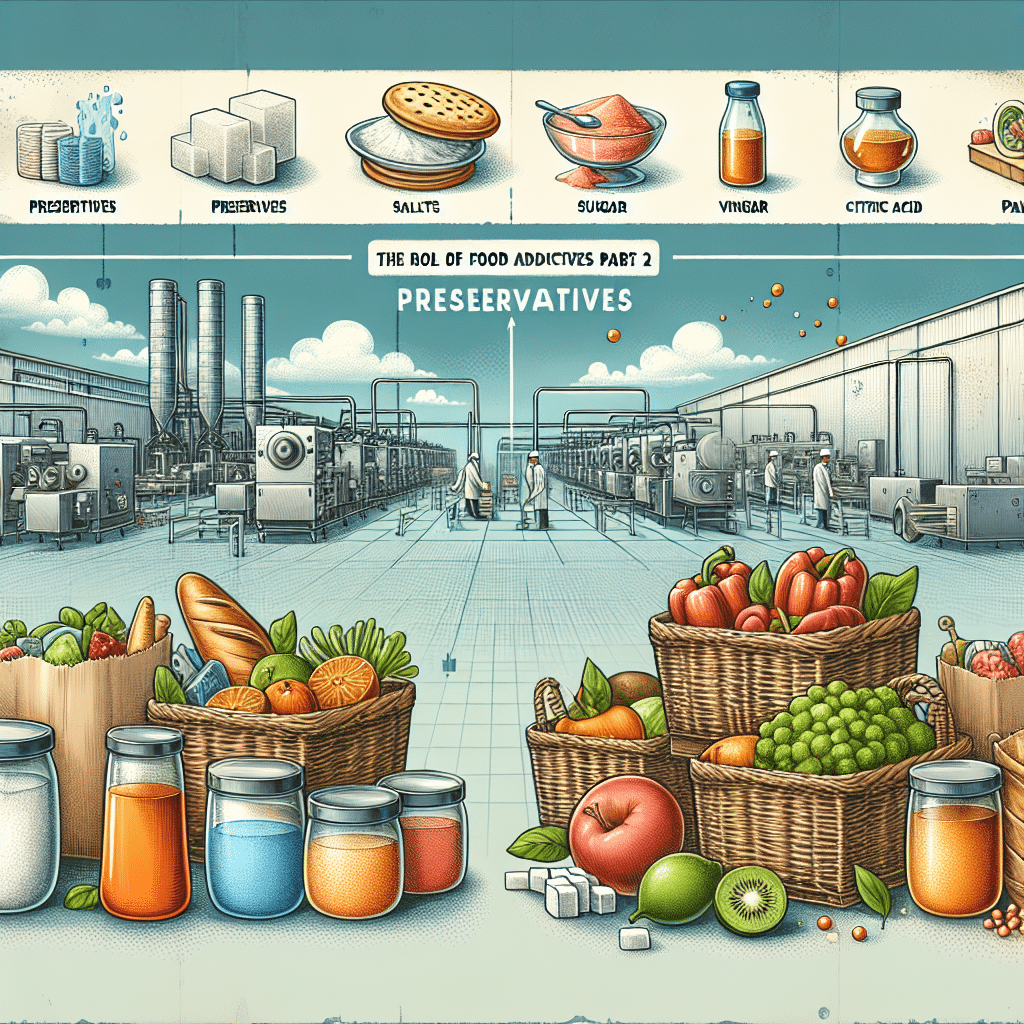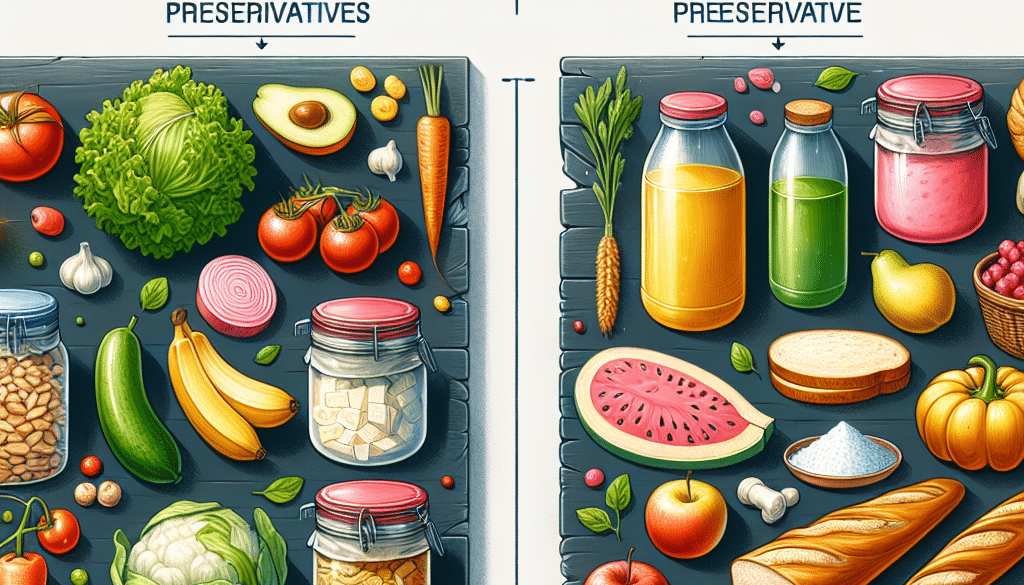The Role of Food Additives Part 2: Preservatives
-
Table of Contents
- Understanding the Role of Food Additives: The Importance of Preservatives
- What Are Preservatives and Why Are They Used?
- Types of Preservatives and Their Applications
- Case Studies: The Impact of Preservatives on Food Safety
- Debates and Regulations Surrounding Food Preservatives
- Preservatives and Public Health: Balancing Safety and Nutrition
- Conclusion: The Essential Role of Preservatives in Modern Food Systems
- Discover ETChem’s Protein Products
Understanding the Role of Food Additives: The Importance of Preservatives

Food additives have been used for centuries to enhance the flavor, appearance, and shelf life of various food products. Among these additives, preservatives play a crucial role in maintaining food quality and safety by inhibiting the growth of harmful bacteria, yeasts, and molds. This article delves into the world of preservatives, exploring their functions, types, and the impact they have on our food supply.
What Are Preservatives and Why Are They Used?
Preservatives are substances added to food products to prevent spoilage and extend shelf life. They work by slowing down the oxidation process, inhibiting microbial growth, and maintaining the nutritional value and safety of the food. The use of preservatives is essential in today’s global food market, where products often travel long distances and need to remain fresh for extended periods.
Types of Preservatives and Their Applications
There are several types of preservatives, each with specific applications and mechanisms of action. Here are some of the most common ones:
- Natural Preservatives: These include salt, sugar, vinegar, and certain herbs and spices that have been used for centuries to preserve food.
- Chemical Preservatives: These are synthetically produced and include substances like sodium benzoate, potassium sorbate, and sulfites.
- Antioxidants: These compounds, such as ascorbic acid (vitamin C) and tocopherols (vitamin E), prevent oxidation and rancidity in fats and oils.
Each type of preservative is suited for different food products, depending on the food’s pH, water activity, and intended shelf life.
Case Studies: The Impact of Preservatives on Food Safety
Several case studies highlight the importance of preservatives in preventing foodborne illnesses and spoilage:
- In the early 20th century, the use of sodium benzoate helped curb the growth of bacteria in acidic foods like pickles and fruit preserves, significantly reducing cases of food poisoning.
- The introduction of sulfites in wine production has played a pivotal role in preventing microbial spoilage and maintaining the wine’s flavor profile.
These examples underscore the critical role preservatives play in ensuring the safety and longevity of our food supply.
Debates and Regulations Surrounding Food Preservatives
While preservatives are essential for food safety, their use has sparked debates concerning health and consumer rights. Regulatory bodies like the FDA and EFSA have established strict guidelines for the use of preservatives, ensuring that they are safe for consumption at specified levels. However, consumer demand for “clean labels” and natural products has led to increased scrutiny of synthetic preservatives and a push for natural alternatives.
Preservatives and Public Health: Balancing Safety and Nutrition
Preservatives play a dual role in public health by preventing foodborne illnesses and potentially impacting long-term health. Studies have shown that excessive consumption of certain preservatives may be linked to health issues, leading to calls for moderation and more natural preservation methods. However, the benefits of preservatives in preventing immediate health risks from spoiled food are undeniable.
Conclusion: The Essential Role of Preservatives in Modern Food Systems
In conclusion, preservatives are a vital component of the food industry, ensuring that products remain safe and of high quality from production to consumption. While there is ongoing debate about their use, the evidence supports the responsible use of preservatives as part of a safe and sustainable food system. As consumer preferences evolve, the industry continues to innovate, seeking new ways to preserve food naturally without compromising safety or quality.
Discover ETChem’s Protein Products
In addition to understanding the role of preservatives, it’s important to consider the quality of the ingredients used in food production. ETChem offers a range of high-quality protein products that can enhance the nutritional value of various food and beverage items. Their extensive selection of collagens, including marine, fish, bovine, and chicken collagen, provides manufacturers with versatile options for product development. With a focus on purity, solubility, and neutral taste, ETChem’s protein offerings are ideal for a wide array of applications in the food and beverage industry.
About ETChem:
ETChem, a reputable Chinese Collagen factory manufacturer and supplier, is renowned for producing, stocking, exporting, and delivering the highest quality collagens. They include marine collagen, fish collagen, bovine collagen, chicken collagen, type I collagen, type II collagen and type III collagen etc. Their offerings, characterized by a neutral taste, instant solubility attributes, cater to a diverse range of industries. They serve nutraceutical, pharmaceutical, cosmeceutical, veterinary, as well as food and beverage finished product distributors, traders, and manufacturers across Europe, USA, Canada, Australia, Thailand, Japan, Korea, Brazil, and Chile, among others.
ETChem specialization includes exporting and delivering tailor-made collagen powder and finished collagen nutritional supplements. Their extensive product range covers sectors like Food and Beverage, Sports Nutrition, Weight Management, Dietary Supplements, Health and Wellness Products, ensuring comprehensive solutions to meet all your protein needs.
As a trusted company by leading global food and beverage brands and Fortune 500 companies, ETChem reinforces China’s reputation in the global arena. For more information or to sample their products, please contact them and email karen(at)et-chem.com today.




